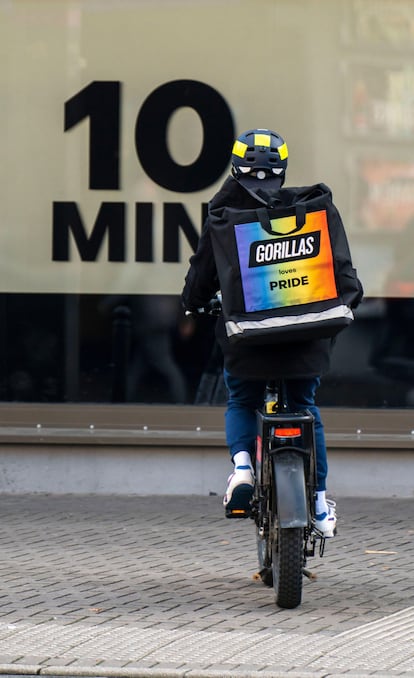What is the real price of having your dinner delivered in 10 minutes?
App-enabled delivery services are running out of gas as consumers return to their pre-pandemic shopping routines

It’s happening in New York, Berlin and Madrid – layoffs and cutbacks at unicorn start-ups (companies valued at $1 billion) such as Gorillas, Jokr, Getir and Gopuff. Others such as Buyk, Fridge No More or Zero Grocery have vanished as quickly as they appeared.
App-enabled delivery services arose out of our obsession with speed and pandemic-imposed confinement, but many have now lost their shine. Leaving the house in search of a loaf of bread is no longer an epic journey. In fact, it can even be enjoyable. But some investors assumed that the daily routines adopted during the pandemic were here to stay. In retrospect, we now know that dystopias come and go, and that part of the gratification we get from consumption comes from taking chances and human contact, some of the best aspects of urban life.
The collapse of ultra-fast delivery services signals the end of the easy money that funded tech start-ups over the past decade. According to The New York Times, investors poured $8 billion into six ultra-fast delivery companies that set up shop in New York over the last two years. Now they are demanding profitability and a return on their investments, but both are hard to come by.
In his 2021 book, Why Startups Fail, Harvard Business School professor Tom Eisenmann explains that ultra-fast shipping companies demonstrate the same vulnerability – initial profits and growth are not sustainable. “The first wave of customers comes easy and cheap because there is always somebody willing to try a promising new service. But to retain that customer base and keep growing, you have to find a lot of people who regularly want ultra-fast shipping.” In other words, you need loyal customers who are willing to pay a little more to have a banana or a box of Ibuprofen delivered to their homes in 10 minutes. When these shipping companies see a drop in demand, they start offering very aggressive discounts. Everything goes downhill from there because “their customers have become addicted to discounts and will never pay a penny more,” said Laureano Turienzo.
Turienzo, the current president of the Spanish Retail Association (Asociación Española de Retail), has watched these services closely. “In order for these companies to meet their promised delivery times, they need to have dark stores [a retail outlet or distribution center that exists exclusively for online shopping] within 10 minutes of every potential customer. They have to cover the whole city, which requires a huge investment that can only be justified by a huge demand that does not exist.”
In some Spanish cities, dark stores were set up in shops that closed down during the pandemic. The shop windows were boarded up and delivery drivers clogged the sidewalks. “The neighborhoods where these dark stores were set up have completely rejected them,” said Turienzo. A Business Insider video shows the frenetic pace inside a dark stores. To meet the 10-minute delivery window, the person fulfilling the order had 100 seconds to find the products, fill the bag and place it in the delivery driver’s backpack. The video shows an employee running down aisles to the checkout post, returning again to get a forgotten item, and then running back to hand the order to a driver who had just over eight minutes left to deliver it. According to Eisenman, most ultra-fast shippers lose money on each transaction, and their marketing encourages low-value orders – the numbers just don’t add up.
“Start-ups have used venture capital to finance the lifestyles of young consumers,” said Felipe Romero, a partner at The Cocktail, a consulting firm that specializes in digital product and service development. “Young customers with little money to spend are practical and creative when it comes to looking for solutions and discounts. They use ride sharing services to move around, jump from one streaming platform to the next, and are hooked on ultra-fast delivery,” said Romero. He believes there has been a convergence of companies with money to spend on aggressive sales promotions and consumers looking for shortcuts. “But the connection between the two is weak and temporary – just as long as the promotion lasts,” he says. Now that lean times are ahead, marketing budgets are being slashed and the companies that survive are facing the enormous challenge of “re-educating” spoiled consumers who maintain their lifestyles with discounts and demonstrate little brand loyalty. What is the real price of having your dinner delivered in 10 minutes? Maybe we don’t want to know.
Tu suscripción se está usando en otro dispositivo
¿Quieres añadir otro usuario a tu suscripción?
Si continúas leyendo en este dispositivo, no se podrá leer en el otro.
FlechaTu suscripción se está usando en otro dispositivo y solo puedes acceder a EL PAÍS desde un dispositivo a la vez.
Si quieres compartir tu cuenta, cambia tu suscripción a la modalidad Premium, así podrás añadir otro usuario. Cada uno accederá con su propia cuenta de email, lo que os permitirá personalizar vuestra experiencia en EL PAÍS.
¿Tienes una suscripción de empresa? Accede aquí para contratar más cuentas.
En el caso de no saber quién está usando tu cuenta, te recomendamos cambiar tu contraseña aquí.
Si decides continuar compartiendo tu cuenta, este mensaje se mostrará en tu dispositivo y en el de la otra persona que está usando tu cuenta de forma indefinida, afectando a tu experiencia de lectura. Puedes consultar aquí los términos y condiciones de la suscripción digital.









































